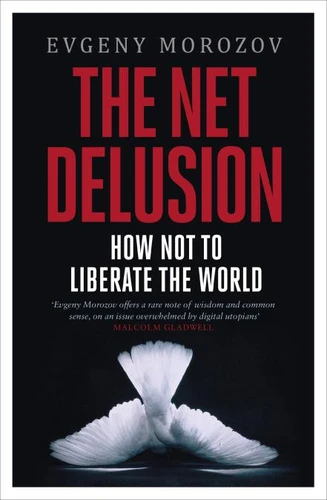The Net Delusion. How Not to Liberate the World
Par :Formats :
Disponible dans votre compte client Decitre ou Furet du Nord dès validation de votre commande. Le format ePub protégé est :
- Compatible avec une lecture sur My Vivlio (smartphone, tablette, ordinateur)
- Compatible avec une lecture sur liseuses Vivlio
- Pour les liseuses autres que Vivlio, vous devez utiliser le logiciel Adobe Digital Edition. Non compatible avec la lecture sur les liseuses Kindle, Remarkable et Sony
- Non compatible avec un achat hors France métropolitaine
 , qui est-ce ?
, qui est-ce ?Notre partenaire de plateforme de lecture numérique où vous retrouverez l'ensemble de vos ebooks gratuitement
Pour en savoir plus sur nos ebooks, consultez notre aide en ligne ici
- Nombre de pages432
- FormatePub
- ISBN978-0-14-196182-8
- EAN9780141961828
- Date de parution06/01/2011
- Copier Coller02 page(s) autorisée(s)
- Protection num.Adobe DRM
- Infos supplémentairesepub
- ÉditeurPENGUIN
Résumé
Does free information mean free people?At the start of the twenty-first century we were promised that the internet would liberate the world. We could come together as never before, and from Iran's 'twitter revolution' to Facebook 'activism', technological innovationwould spread democracy to oppressed peoples everywhere. We couldn't have been more wrong. In The Net Delusion Evgeny Morozov destroys this myth, arguing that 'internet freedom' is an illusion, and that technology has failed to help protect people's rights.
Not only that - in many cases the internet is actually helping authoritarian regimes. From China to Russia to Iran, oppressive governments are using cyberspace to stifle dissent: planting clandestine propaganda, employing sophisticated digital censorship andusing online surveillance. We are all being manipulated in more subtle ways too - becoming pacified by the net, instead of truly engaging. This book is a wake-up call.
It shows us how our misplaced faith in cyber-utopia means the West risks missing the real challenges. Morozov argues that we must look at other ways of promoting democracy abroad, and forces us - policymakers and citizens alike - to recognize that all our freedoms are at stake.
Not only that - in many cases the internet is actually helping authoritarian regimes. From China to Russia to Iran, oppressive governments are using cyberspace to stifle dissent: planting clandestine propaganda, employing sophisticated digital censorship andusing online surveillance. We are all being manipulated in more subtle ways too - becoming pacified by the net, instead of truly engaging. This book is a wake-up call.
It shows us how our misplaced faith in cyber-utopia means the West risks missing the real challenges. Morozov argues that we must look at other ways of promoting democracy abroad, and forces us - policymakers and citizens alike - to recognize that all our freedoms are at stake.
Does free information mean free people?At the start of the twenty-first century we were promised that the internet would liberate the world. We could come together as never before, and from Iran's 'twitter revolution' to Facebook 'activism', technological innovationwould spread democracy to oppressed peoples everywhere. We couldn't have been more wrong. In The Net Delusion Evgeny Morozov destroys this myth, arguing that 'internet freedom' is an illusion, and that technology has failed to help protect people's rights.
Not only that - in many cases the internet is actually helping authoritarian regimes. From China to Russia to Iran, oppressive governments are using cyberspace to stifle dissent: planting clandestine propaganda, employing sophisticated digital censorship andusing online surveillance. We are all being manipulated in more subtle ways too - becoming pacified by the net, instead of truly engaging. This book is a wake-up call.
It shows us how our misplaced faith in cyber-utopia means the West risks missing the real challenges. Morozov argues that we must look at other ways of promoting democracy abroad, and forces us - policymakers and citizens alike - to recognize that all our freedoms are at stake.
Not only that - in many cases the internet is actually helping authoritarian regimes. From China to Russia to Iran, oppressive governments are using cyberspace to stifle dissent: planting clandestine propaganda, employing sophisticated digital censorship andusing online surveillance. We are all being manipulated in more subtle ways too - becoming pacified by the net, instead of truly engaging. This book is a wake-up call.
It shows us how our misplaced faith in cyber-utopia means the West risks missing the real challenges. Morozov argues that we must look at other ways of promoting democracy abroad, and forces us - policymakers and citizens alike - to recognize that all our freedoms are at stake.








